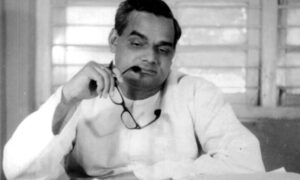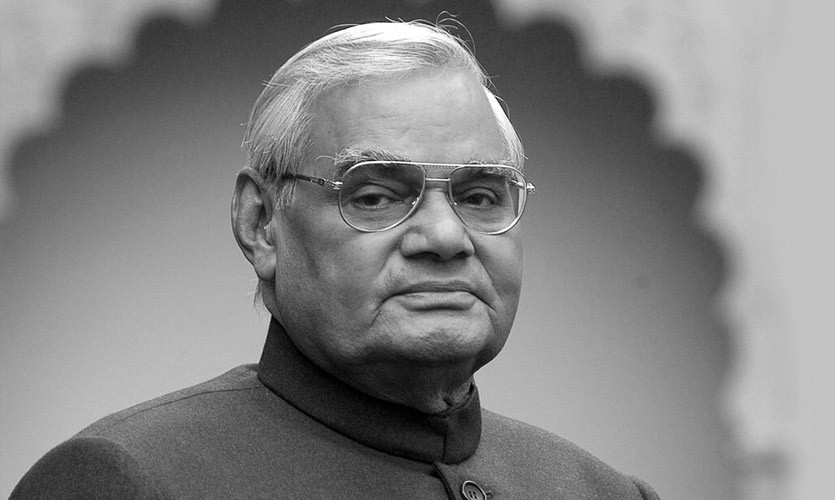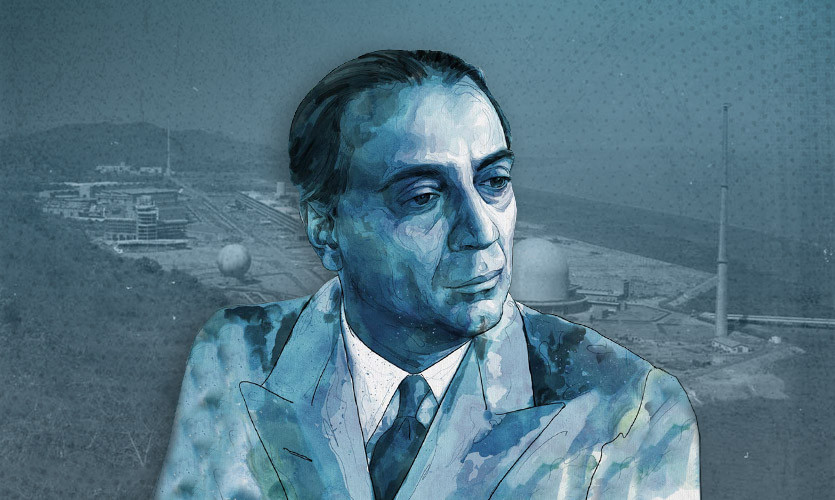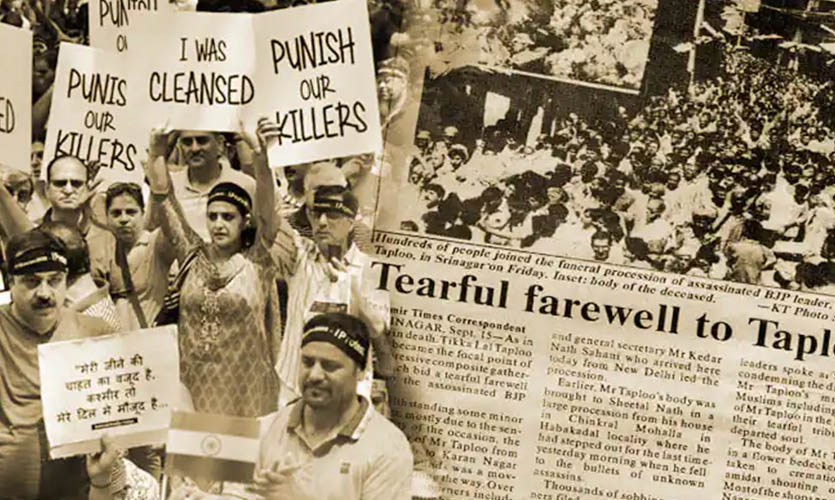“सरकारें आएंगी जाएंगी, पार्टियां बनेंगी बिगड़ेंगी, मगर ये देश रहना चाहिए,
इस देश का लोकतंत्र अमर रहना चाहिए।”
– अटल बिहारी वाजपेयी
Our leaders today may not agree on much but there is none across political divides who would deny the honesty and prowess of the untainted leader that was Atal Bihari Vajpayee. A brilliant statesman and a politician of contrast, his birth anniversary marks the celebration of good governance in India.
Governance
It would be remiss to not start with what Vajpayee’s government is most remembered for, i.e., putting India on the nuclear map, and subsequently brokering peace in the region. Originating under Jawaharlal Nehru and weaponised under Indira Gandhi, India’s nuclear program progressed gradually under every prime minister. “Rao told me that the bomb was ready. I only exploded it,” revealed Vajpayee after former PM P.V. Narsimha Rao’s demise in 2004. “Saamagri tayyar hai (The ingredients are ready). You can go ahead,” Rao had said after Vajpayee took over from him as prime minister in May 1996.
Vajpayee had reportedly given the orders for nuclear tests in 1996 but then rescinded them when his government seemed unlikely to last. The tests had been postponed in 1995 after the US discovered the preparations for them in Pokhran. A Western sanction was inevitable, and it would have been difficult to sustain it without his own house in order. However, after returning to power in 1998 he ratified the tests. Five tests were conducted between May 11 and 13, the preparations for which went undetected by the CIA. This was followed by sanctions by Western governments that lasted five years. Pakistan, which tested its nuclear weapons days after India faced the same consequences.
India was able to bear the sanctions by making domestic changes. Overseeing a caretaker government of 13 months had not deterred Vajpayee from enhancing India’s nuclear capability. However, he also took steps to increase peaceful engagement in the region, mainly with China and Pakistan. In an unprecedented move, after gradual improvements in diplomatic relations, Vajpayee undertook a bus journey from Amritsar to Lahore in February 1999. It marked a new milestone in Indo-Pak relations and was followed by the Lahore Declaration that brought added responsibility on both nations to avoid a nuclear war. The move was hailed by the international community and domestically, however, the euphoria did not last. In May 1999, Kashmiri shepherds discovered that Pakistani forces and militants had infiltrated the Kashmir Valley. India launched Operation Vijay on May 26, 1999, leading to the Kargil War. While Vajpayee exercised caution and stuck to conventional methods instead of going for the nuclear option, journalist Barkha Dutt later revealed in her book that he had considered crossing the Line of Control (LoC). “The (Indian) army chief was blunt with the PM: ‘If we can’t undo this in Kargil, I will have to attack somewhere else.’ He made it clear that a new war front could soon be opened in another part of the subcontinent — one that, by definition, involved crossing over,” wrote Dutt in ‘This Unquiet Land — Stories from India’s Fault Lines’. In a letter to US President Bill Clinton, Vajpayee had bluntly stated, “We will get them out, One way or the other.” According to the book, Clinton had sent the commander-in-chief of US Central Command Anthony Zinni to Pakistan to meet with General Pervez Musharraf, who is believed to be the chief architect of the Pakistani infiltration. After being pressed to intervene on the issue of Kashmir, Zinni reportedly told Musharraf, “My mandate is Kargil, not Kashmir… If you don’t pull back, you’re going to bring war and nuclear annihilation down on your own country.” The Kargil War resulted in the deaths of over 500 Indian soldiers and 600-4000 Pakistani militants and soldiers. Despite the war, Vajpayee continued to make efforts at peacebuilding with Pakistan. He explained that you may be able to change friends, but not neighbours. His recognition of Tibet as part of China, although controversial, led to the nation publicly recognising Sikkim as an integral part of India.
Vajpayee’s NDA coalition finally won a majority in the Lok Sabha in the aftermath of the Kargil War, securing 303 seats out of 534. He became the first prime minister not belonging to the Indian National Congress to serve a full term in office. After taking oath in October 1999, however, Vajpayee’s government was faced with a series of tough tasks to tackle. In December 1999, Indian Airlines flight IC 814 from Kathmandu to New Delhi was hijacked by five terrorists and flown to Afghanistan. Since India did not recognise the Taliban regime in the country at the time, negotiations were uncertain. Bringing down the terrorists’ demand for the release of 36 prisoners to 3, India released Jaish-e-Muhammed founder Maulana Masood Azhar, who has been implicated in the 2001 Indian Parliament attack, 2008 Mumbai attacks, and the 2019 Pulwama attack. The country also released Ahmed Omar Saeed Sheikh, who was arrested in Pakistan in 2002 for his alleged role in the 9/11 attacks, and the murder of Wall Street Journal journalist Daniel Pearl.
The incident was described as a “diplomatic failure” of the Indian government by Intelligence Bureau chief Ajit Doval. He had stated that the plane should not have been allowed to leave Indian territory when it was refuelling in Amritsar and added that the government was unable to use its ties with the US and the UAE aptly. Home Minister L.K. Advani had also warned of the effect on the popularity of the government at home if the prisoners were released. However, Vajpayee could not entertain the possibility of flying home 176 bodies.
Vajpayee was hoping to win the ensuing general election in 2004 on the back of liberal economic reforms. After about 5 percent GDP growth from 1999 to 2002, the reforms implemented in 2002 and 2003 ensured a GDP growth exceeding 7 percent from 2003 to 2007, despite the economic sanctions following Pokhran. By increasing foreign investment, privatising various companies, sparking the telecom revolution with revenue sharing and implementing the Fiscal Responsibility and Budget Management Act, the Vajpayee administration managed to substantially “roll back the bloated socialist state from the commanding heights of the economy”. It is also responsible for the network of roads in India that form the Golden Quadrilateral. These developments, however, were not enough to get Vajpayee another term in office.
After the attack on the Parliament of India in 2001, Vajpayee’s government was marred by communal tensions. The 2002 Gujarat riots had played a significant role in the ouster of the BJP government from the Centre. “Godhra’s incident was shameful, but what happened in Gujarat after that is even more condemnable,” he had said during his visit to the state. When asked what he would like to say to Gujarat Chief Minister Narendra Modi, Vajpayee had said, “My one message to the chief minister is that he should follow the Raj Dharam… These are very meaningful words. I am also following this. For a ruler, there shall be no discrimination for his subjects on the basis of birth, caste or religion.” While he himself had come under fire for not doing enough to stop the violence in Gujarat, Vajpayee refrained from chastising Modi in public, whose administration was believed to be complicit in encouraging the retaliatory violence. After losing the election in 2004, Vajpayee said that not removing Modi was a mistake and had a nationwide impact, especially with the Opposition’s political manoeuvre. Without mincing words, Vajpayee had later confirmed that he had personally favoured Modi’s removal as Gujarat CM but it was not acceptable to the RSS. Noteworthy, one of Modi’s first acts after becoming the Prime Minister of India in 2014 was to designate Vajpayee’s birthday as Good Governance Day.
A Moral Statesman Before A Politician

A poet and former journalist, Vajpayee was projected as the prime ministerial candidate by BJP President Advani for the 1996 general election. “Reluctant to accept it at first, he realised it was the need of the hour,” says politics and international relations scholar D.V. Patel. He added, “He was a force to reckon with not just for the RSS or BJP but also the Congress.” When India was facing the possibility of worldwide economic sanctions after Pakistan tried to internationalise the matter of Kashmir as an unresolved issue of the partition during P.V. Narsimha Rao’s administration, the prime minister sent a hand-picked team to Geneva. He chose opposition leader and BJP co-founder Vajpayee to lead the team and appear before the United Nations Commission on Human Rights (UNCHR) to present India’s case. “That was an occasion when India’s voice had to be heard as one voice. (Nowadays) there is a lot of ‘one nation, one election talk’ but that (in 1994) was truly one voice of India where Vajpayee, the leader of the opposition, was chosen to lead the delegation to Geneva,” said senior Congress leader Salman Khurshid after Vajpayee’s demise in 2018. Khurshid was also part of the delegation sent to Geneva. He added, “There was no desperation in the opposition, at that time led by Vajpayee, to snatch power away from the party that ruled. There was a kind of attitude and atmosphere that worked towards people getting together.”
Pakistan had convinced the Organisation of Islamic Countries to move a resolution to sanction India over alleged human rights violations in Kashmir. Assisted by behind-the-scenes actions taken by Rao to reassure Iran, the team was successful in stopping the issue from going to a vote. Although upon the delegation’s return to India, amid celebrations, Vajpayee maintained, “For a great nation like us, there was a certain humiliation involved in having to go around begging for votes on a human rights issue. Let us now use this reprieve to clean up our act in Kashmir or there will be a Geneva every few months.”
D.V. Patel recounts one of the rare times that Vajpayee lost an election. “Madhavrao Scindia had chosen to fight from Gwalior at the last minute, resulting in Vajpayee’s defeat by a very thin margin. But the grace he maintained cannot be expected of a mere politician,” he explains. In his book, Vajpayee revealed, “When the question of my higher education was looming large on the family, which was already burdened under the marriage of my two sisters, and limited resources due to retirement of father, the royal family sanctioned me monthly scholarship of Rs 75.” The scholarship made his law education at the DAV college in Kanpur possible. It was there that he encountered the Arya Samaj and the RSS, became the editor of the Sangh’s monthly magazine Rashtradharm and subsequently the editor of its mouthpiece Panchjanya.
Patel asserts, “We rewarded Vajpayee’s love for the country by not voting him back into power. We, as a people, chose a foreign citizen to lead us. When he lost, India lost too.” Arun Shourie has famously said, “When Vajpayee made a promise people believed him.” He was often referred to as the right man in the wrong party. He had reiterated in the Lok Sabha during his resignation speech that leaders across some parties felt that “Vajpayee toh accha hai par party theek nahi hai.” After an overwhelming agreement in the House, he continued, “Toh acche Vajpayee ka kya karne ka iraada rakhte hain aap?” On allegations of factionalism within the BJP, between him and Advani, he memorably said, “Main kisi dal-dal mein nahi hoon. Main auron ke dal-dal mein apna kamal khilaata hoon.”
Vajpayee did not fall short of his loyalty to the country or party. However, he made sure India was always put first, be it while in power or in opposition.
“पांच हज़ार साल की संस्कृति – गर्व करें या रोएँ?
स्वार्थ की दौड़ में कहीं आजादी फिर से न खोएँ।”
– वाजपेयी
The Horus Eye is a weekly column written by Divya Bhan analysing current affairs and policies. This column does not intend or aim to promote any ideology and does not reflect the official position of The Sparrow.
Also read: Does The BJP Stand To Gain From Building Temples In The 2022 UP Election?
Also read: Sardar Patel: A Statesman Who Transcended Gandhian Politics










